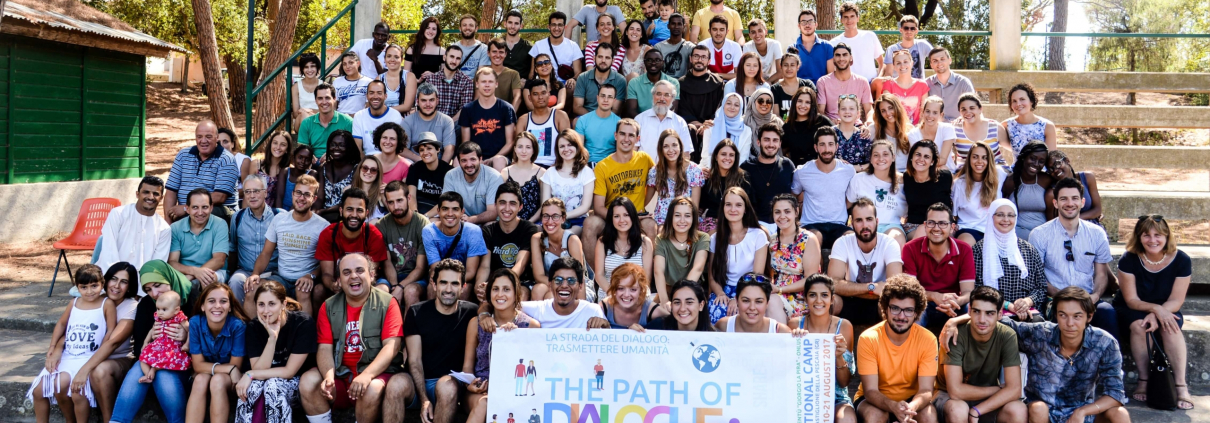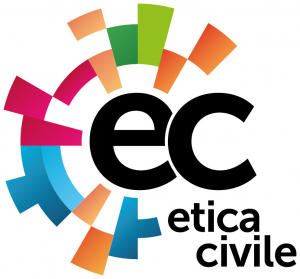The Path of Dialogue – Broadcast Humanity
FINAL DOCUMENT – INTERNATIONAL CAMP 2017
In the last years the world has been changing a great deal, and the way we communicate with each other, both for what concerns contents and means, has been shaken upside down. We young people from International Camp are walking together on a path towards understanding the causes and perspectives of such a radical evolution of our relationships and communities.
The new technological tools gave us a whole new power in collecting and sharing information, communicating with each other, alongside other opportunities. Nevertheless, in order to make the best out of them, we need to be aware of and face the risks they entail. Such a process is still going on, hence there are many challenges and the importance of good questions is vital, since these issues are not set on stone. Thus, we urge to avoid any kind of judgment, while we find more fruitful to shed some light and give a new perspective on these challenges.
One of the most pervasive changes is represented by social media, which our attention was focused on the most during the Camp. Many people risk becoming objects instead of subjects of social media. Their identity is increasingly shaped by social media contents and by their networks, while the dimension of communicating themselves and their perspective to others is losing its role and importance. In fact, in the social media environment, where being seen means to exist, virtual identities often represent masks of whom we are asked to be.
On the other hand, in order to be active subjects – even in this new environment – we have to be faithful to ourselves and to our values. This is the only way we can really communicate something authentic, generating as a result authentic relationships as well. Moreover, it is crucial to acknowledge that our identity is always evolving and being defined by our social and cultural background, so that being aware of the differences among each other represents a cornerstone for communication.
Given that social networks are a virtual meeting place, and they act as a filter between virtual and real life, they cannot be neutral communication tools. They can have a strong impact and influence on our perspective, and it is blatant that we need to be conscious of the differences between those two worlds. For instance, in face-to-face relationships the better part of what is said stands from non-verbal communication, which is absent from behind a screen. Hence, weighting the words we use is fundamental, as they represent the main communicative channel we can use on social networks.
What has been said so far makes clear that we cannot easily detach our real life from our virtual one. Thus, education to the social media world represents the biggest challenge in this respect. There is not a standardized way of dealing with said media, since it depends on our personalities and backgrounds, but we can set some guidelines in order to help us. Why do I need to share this? Am I just looking for attention or appreciation? Is the information I’m sharing needed? Is it true?
In this respect, educting to the richness of diversities is crucial, in order to avoid hatred and violence towards those who have different opinions and backgrounds. Our communities are getting more and more diverse, so dialogue is essential if we want to grow together.
Social media have also an impact on citizenship and democratic dynamics. They amplify news, opinions and reactions to events on a global level. Instantaneous emotions are in the foreground and they deeply affect the understanding of what happens in the society, while reasoning and an in-depth analysis are often left in the background.
This example highlights the polarization of society: each of us can choose who to follow, what to share and where to gather information from, allowing us to reinforce our own beliefs. If used this way, social media become shields, and not sharing instruments.
Information is made also by peers sharing content, while the role of usual gatekeepers results being diminished. As a consequence, their authoritativeness is endangered, as is the ability to detect what is true and what is not. It is not by chance that the relevance of fake news in social dynamics is skyrocketing and many people are not able or not even interested in dealing with that.
A correlated issue is represented by the lack of pluralism that social media might generate. In fact, even though theoretically social networks increase the number of available sources, we are less exposed to a plurality of opinions. This enhances divisions and misunderstandings within communities at every level (families, municipalities, nations, global community).
Therefore, we urge to stress the role of personal responsibility of what happens in social media: since each of us is becoming a gatekeeper of the quality of the information and democracy, we have to bear the consequences of our virtual actions as we do with “real” ones. This allows to safeguard the dimension of memory and perspective, which is very endangered by a world where the only thing that matters is the present moment, while what happened yesterday is already forgotten and what is going to happen tomorrow neglected.
In recovering and safeguarding those dimensions, religious and spiritual traditions have a great deal of importance.
Our religious and spiritual dimension requires time and listening so that we are able to see our future as a part of our path and not as a mere and immediate reaction to what is happening, grasping the streams of the event in a harmonious manner. Both in the Biblical and Quranic traditions, God invites His people to listen and read: “Shema Israel!” (see, Deuteronomy 6, 4-7 and Quran 112); “Iqraa’!” (see Quran 96:1).
Nowadays, we are dealing with something different: new media tend to spread words of hatred through religions, giving ground to fundamentalists. At the end of the day, the latter are individuals who speaking – or screaming – the most about God, at the very same time, are those who speak the least with God, employing religions as a means for violent communication and actions.
They testify a religion devoid of God, without faith. But God does not scream; as a wise man once said: “God is so humble that He only speaks when everyone else is silent”. For this reason, we try and commit ourselves to be silent in order to recognize the whisper of God in the wind, as prophet Elias experienced in the Oreb (1 Kings 19, 12-13).
We, young people participating in the International Camp at “La Vela” Village, acknowledge our duty to communicate what we experienced about religions and faith. They are not meant for war and conflicts but for loving people next and far from you: “They shall beat their swords into plowshares and their spears into pruning hooks; One nation shall not raise the sword against another, nor shall they train for war again” (Isaiah 2, 4).
We, adepts to Abrahamic religions, got the chance to meet each other, we discovered different approaches to faith, and we also shared similar hopes, fears, fragilities and difficulties. We understood and experienced that the only meaningful way of communicating our religion implies to be transparent and consistent testimonies of our faith.
This is the understanding, the commitment and the message of hope that we, people gathered from different countries, want to spread in here and to the rest of the world. We are over 100 young people with different religious backgrounds, coming from Albania, Angola, Bangladesh, Bolivia, Democratic Republic of Congo, Ecuador, Germany, Israel, Italy, Morocco, Palestine, Peru, Romania, Russia, Yemen.
With this document we commit ourselves to bring into the world the way of communicating and dialoguing we lived and experienced at “La Vela” Village, in order to build all together a path of peace, based on a common ground of listening and respect; a community of men and women of good will in which words are never used as weapons to hurt but as an outstretched hand ready for binding together our diversities; a human family in which we are able to recognize ourselves as brothers and sisters.





